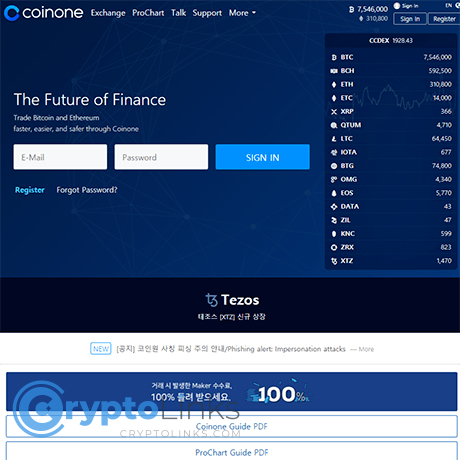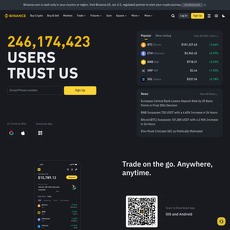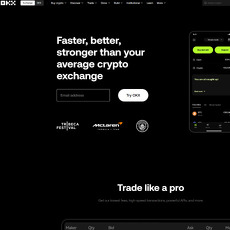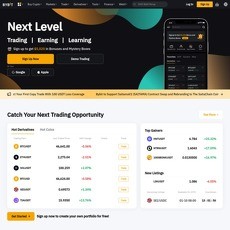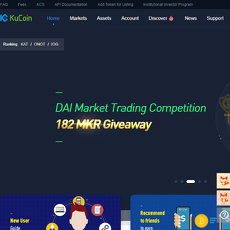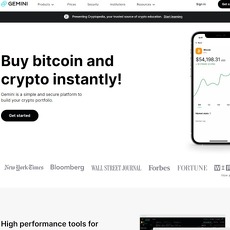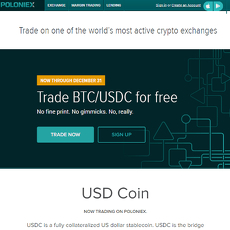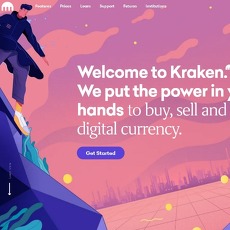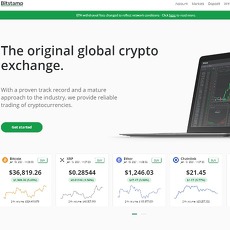Cionone Review
Cionone
coinone.co.kr
Cionone Review Guide: Is This Korean Crypto Exchange Worth Your Time?
Are you thinking about trading cryptocurrency on Cionone, but feeling a bit unsure if it's safe, trustworthy, or even worth the effort? I totally get it. When it comes to crypto, deciding where you'll trade isn't easy. In a market crowded with dozens of platforms all promising to be the "best," finding a truly reliable exchange like Cionone can be quite the challenge.
Problems You Might Face With Cryptocurrency Exchanges
So what's actually holding you back from diving into crypto trading easily?
From what I've seen when reviewing various platforms, traders usually run into very similar concerns:
- User experience confusion: So many platforms overcrowd their design, making it incredibly hard (and annoying!) to just place trades efficiently.
- Unexpectedly high fees: You think you've found a good exchange, but suddenly, hidden costs pop out of nowhere and start eating into your profits.
- Security worries: Crypto exchanges aren't always as secure as they claim, creating stress and uncertainty about trusting your hard-earned money.
- Poor customer support: Ever had an issue that needed a quick fix, only to wait for days or weeks without proper help? It happens way too often, unfortunately.
- Language barriers: Especially involving international exchanges, language gaps can make basic actions complicated.
Trust me, it's essential to clear up these concerns before you commit your cash or energy into any crypto exchange.
Don’t Worry—I’m Here to Guide You Through Your Cionone Journey
Don't stress! I'm here to use all my experience reviewing cryptocurrency platforms to walk you step-by-step through everything you must know about Cionone. I'll show you exactly what matters, so you can decide clearly whether Coinone works for you, or if you might be better off with another option.
I’ll give you the real deal insights, without any fluff or favoritism to help you understand the ins and outs clearly.
Is Cionone User-Friendly and Safe?
You’re probably wondering—is Coinone easy to navigate? Is it safe enough to store your crypto holdings comfortably? After all, usability and security are probably at the top of your requirements checklist.
In this guide, I'll carefully break down everything—from the platform's ease of use and the features it offers to its security standards. You’ll receive practical advice straight from my experience-backed and unbiased viewpoint.
Ready to see if Cionone fits exactly what you need, or if it's just another exchange that might waste your time? Let's start by looking at some crucial background info you'll want to know.
Cionone: Quick Background & General Overview
When you're planning to trade crypto in Korea, one name that inevitably pops up is Cionone. If you’re unfamiliar with this exchange or already thinking about giving it a shot, let’s quickly explore what exactly it is and why it matters so much in Korea’s busy crypto market.
What Exactly is Cionone?
Cionone isn't exactly fresh on the crypto scene—it launched back in 2014, becoming one of the earliest and most influential cryptocurrency exchanges in South Korea. If longevity means credibility to you, then Coinone’s nearly decade-long track record might instantly earn your trust.
Originally founded with the mission of simplifying crypto trading for Koreans, it quickly grew into a major player. The platform’s goal was always clear: provide secure, straightforward crypto exchange services to a growing South Korean blockchain community.
“Trust takes years to build, seconds to break, and forever to repair.”
Why does this matter to you as a trader? When you trust someone with your money, you're really trusting them with your peace of mind. Coinone has managed to solidify itself as a dependable choice for thousands of traders, earning that sought-after peace of mind. But let’s see why exactly so many people rely on this platform.
Why Are Traders Interested In Cionone?
There's no smoke without fire, right? Coinone didn't become popular for no reason. Let’s briefly check exactly what draws traders to Coinone:
- Strong Reputation in Korea: Coinone is among the top-three crypto exchanges domestically, trusted by Korean crypto enthusiasts for its reliability and established history.
- Variety of crypto assets available: Traders appreciate Coinone's well-curated selection of cryptocurrencies, including big favorites like Bitcoin (BTC), Ethereum (ETH), Ripple (XRP), and various emerging altcoins tailored to Korean audience preferences.
- User-friendly design: Although we'll closely look into this later, it's worth mentioning that trading interfaces matter—Coinone’s design typically grabs traders' attention right away.
- Reliable Track Record: Very few crypto exchanges keep a flawless security record, but Coinone has notably maintained solid reliability, with minimal incidents since its inception.
Coinone continues attracting serious Korean crypto traders, newbies looking to enter the market, and veteran enthusiasts who find comfort in its proven staying power. It's easy to see why it's popular: longevity, trustworthiness, ease of use, and an appealing crypto selection.
But hold on a second—does longevity necessarily mean Coinone is really simple to use or suits your particular style of trading? Being popular doesn't automatically mean user-friendly. Are you curious if Coinone’s interface actually suits your personal trading preferences?
Let’s take an honest look at Coinone’s user interface and overall experience next, to see if this platform is truly as friendly and easy-to-navigate as its reputation suggests.
How Easy Is Cionone to Use? Interface & User Experience
When picking a crypto exchange, we all know ease-of-use makes or breaks the entire trading experience. Think about it for a second—how frustrating is it to spend ages figuring out complex layouts just when you spot that perfect trade? So let’s evaluate Cionone to see if their user experience actually makes your crypto life easier.
"Design is not just what it looks like and feels like. Design is how it works." – Steve Jobs
Platform & Trading Interface
The moment you log into Coinone, you notice a neat, streamlined design that seems beginner-friendly at first glance. After giving it a thorough test myself, I found navigating between different sections such as balances, trading charts, and purchase windows smooth and hassle-free.
The home dashboard provides quick access to major cryptocurrency markets—think Bitcoin and Ethereum—and you can easily track price movements without squinting at tiny screens. One feature I particularly appreciate is Coinone’s clear charts powered by TradingView integration. If you have some experience with exchanges, you probably understand how vital TradingView is in the crypto trading community—it’s simply the gold standard for accurate analysis.
However, if you're an advanced trader seeking more complex trading functionalities, how does Coinone stack up? Here's good news—the exchange has your back. Cionone neatly blends beginner-friendly elements with interfaces geared towards seasoned traders, such as limit and market orders, clearly visible order books, detailed trade histories, and sophisticated price alerts.
- Beginner-Friendly Features: straightforward buying/selling, clearly presented balances & market prices.
- Advanced Features:TradingView chart integration, advanced order types, and detailed order books.
The only potential drawback I've noticed is navigation between advanced features can feel slightly cluttered for complete newbies. But here’s the catch—even if you’re unfamiliar, Coinone’s learning curve doesn’t feel steep at all. And within just a couple of trades, you'll quickly see yourself comfortably maneuvering around the exchange.
Supported Languages & Accessibility
People often overlook accessibility until it becomes a barrier. Cionone was primarily built for Korean audiences—and yes, its default language is Korean. But don't worry, they didn't completely ignore global audiences; you can easily switch to English using a toggle.
However, let’s be real here—the English version isn't as comprehensive or polished as the Korean one. Some parts of the site still display untranslated Korean text, which can cause a momentary hassle if you don't speak the language. Could language cause friction for international users looking to enter the platform? Unfortunately, yes. But if you're from outside Korea and still eager to trade on Coinone, utilizing Chrome's translator or having Korean-speaking friends might simplify your journey.
- Main Language: Korean (fully supported)
- Secondary Language: English (partially supported; web translator recommended)
Interestingly, data suggests that user experience ranks among the top considerations for traders choosing an exchange. According to CryptoCompare's Exchange Benchmark 2022, platforms that offer seamless navigation and multilingual customer support enjoy significantly higher satisfaction rates and returning visitors. So Cionone clearly has areas to polish, especially if they want to target international traders effectively.
Still wondering if these interface strengths and minor language hiccups outweigh the benefits Coinone offers? Or maybe you're curious to know exactly which cryptocurrencies and trading options Coinone supports?
Trust me, you’ll want to read the next part, because I’m about to show you exactly what's available on Cionone and how these trading options actually measure up in 2023. Curious? Let's see!
Cionone Trading Options & Supported Cryptocurrencies
Alright friend, here comes the exciting stuff! If you're thinking about trading on Cionone, you're probably curious about the coins they offer and if they're diverse enough to really spice up your crypto portfolio. Let's get straight into it and explore what's on the crypto menu there!
Supported Cryptocurrencies & Trading Pairs
Coinone isn't shy when it comes to offering a decent selection of cryptocurrencies. You'll find all the usual suspects like Bitcoin (BTC), Ethereum (ETH), Ripple (XRP), and Litecoin (LTC). However, that's not where it ends—Coinone also surprises users by listing some home-grown Korean projects and up-and-coming altcoins. This thoughtful blend aims directly at local and international traders looking for both trusted names and ambitious new projects.
Here's a quick sample of popular coins you'll see when exploring Coinone’s platform:
- Bitcoin (BTC): The king of crypto is alive and kicking on Coinone, paired directly with the Korean Won (KRW)
- Ethereum (ETH): Available on all respectable exchanges, Coinone pairs ETH mainly with KRW for convenient local trading.
- Ripple (XRP): Surprisingly popular in Korea, XRP is prominently traded and often attracts users with strong local liquidity.
- Klaytn (KLAY): A rising Korean blockchain platform token that has quickly gained traction locally, making Coinone an attractive place for those on the lookout for promising Asian startups.
"Diversification is protection against ignorance. It makes little sense if you know what you're doing." – Warren Buffett
Well, Mr. Buffett might have doubts about diversification, but when it comes to crypto, having access to different coins might actually save the day! After all, the crypto space is volatile, exciting, and full of opportunities waiting to unfold. Having a variety of trading options at your fingertips always keeps your strategy fresh—and Coinone seems to understand that pretty well.
Margin & Leveraged Trading: Does Cionone Offer These?
Here comes something crucial for those adventurous traders out there—does Coinone support margin or leveraged trading?
To keep things straightforward: No, Coinone currently does not offer margin or leveraged trading. This might feel limiting to advanced traders aiming for bigger risk (and potentially bigger rewards), but it also positions Coinone as a safer, simpler marketplace. It's particularly friendly for beginners or traders who prefer keeping clear from the sometimes-dangerous temptation of lending, borrowing, or leveraging positions, especially in a market as unpredictable as crypto.
If you are someone who craves margin trading and feels you've got what it takes, you might find yourself wondering: Does this mean Coinone isn’t reliable enough or simply wants to maintain a secure environment for users?
Well, that's exactly what we'll check out next when we dig deeper into how transparent Coinone’s fee system really is. Will their fee structure make Coinone worthwhile despite the lack of leverage? Or do hidden fees lie in wait? Stick with me—we’ll find out soon enough.
Fees, Deposits, Withdrawals: How Affordable is Cionone?
We all love crypto trading, but when the bills arrive, things get real fast. Just imagine you've made some smart trades and you're ready to cash out—but wait, what's that? A hefty withdrawal fee slicing away from your profits?
Let's not get too dramatic yet. Time to see if Cionone keeps its fee structure transparent and wallet-friendly.
Trading Fee Structure: Clear or Confusing?
Coinone offers a relatively simple, maker-taker fee system, designed to reward traders who add liquidity to markets:
- Maker Fees: Usually around 0.05% to 0.10%
- Taker Fees: Typically range between 0.10% to 0.20%
At first glance, these numbers actually seem quite attractive. And for good reason: compared to popular international rivals like Binance (maker/taker around 0.10%), Okex (0.08%–0.10%) or Bithumb (around 0.04%–0.25%), Coinone sits comfortably competitive against the industry standard. For frequent traders who enjoy placing limit orders and adding liquidity, these reduced maker fees can really add up to solid savings over time.
The ultimate test of clarity? Coinone actually has a dedicated fees page clearly outlining costs per transaction—no hidden catches or sneaky fine-print games. A refreshing approach, if you ask me.
"Transparency is key to trust, and Coinone scores highly for clarity."
Deposit & Withdrawal Methods and Fees
Let's talk about deposits first. Good news: Coinone doesn't impose ridiculous charges when you want to fund your account. Depositing Korean Won (KRW) via local bank transfers usually incurs minimal or no fee. Cryptocurrencies like Bitcoin or Ethereum? Deposits here are free as well.
The withdrawals, however, are where many exchanges start to drain your profits, so pay attention. Coinone again stands out positively by charging reasonable withdrawal fees. Here's a quick look:
- Korean Won (KRW): Local bank withdrawals typically have very low charges, around 1,000 KRW (roughly $0.80) per transfer—pretty affordable.
- Cryptocurrencies: BTC withdrawals are around 0.0005 BTC (approx. $14-16 depending on market), ETH transactions around 0.01 ETH (~$15-20). This aligns quite closely with exchanges like Kraken and Binance.
Overall, deposit and withdrawal fees at Coinone aren't scary—they match or beat the general crypto exchange landscape, especially beneficial for traders frequently moving funds.
But remember, low fees alone don't guarantee a stress-free experience. Which begs the bigger question: is your money truly safe with Coinone? Curious about how Coinone handles security and what their customer support is really like when issues do pop up? Let's find out…
Security and Customer Support: Is Cionone Reliable?
When it comes to cryptocurrency exchanges, security isn't just essential; it's your lifeline. Imagine this—you’ve put in months of hard-earned money, your portfolio is rising beautifully, only to wake up one morning to hear about a security breach. Terrifying, right? Let's find out if Cionone has what it takes to avoid this nightmare.
Security Features & History: Any Incidents To Know?
First, the good news—Coinone doesn’t mess around when it comes to security:
- Cold storage wallets: Coinone keeps a significant portion of your crypto assets offline and out of reach from online threats.
- High-end encryption: Your sensitive information on Coinone's servers is encrypted at multiple levels.
- Two-factor authentication (2FA): Standard protection ensuring only you have access to your account.
Sounds encouraging, doesn't it? Yet, let's be honest here. Is their safety record spotless?
Not exactly. Back in 2017, Coinone faced a well-known hacking attempt, with attackers looking to benefit from security loopholes. But here's the good part—thanks to their security team's quick response, the hackers failed to access user funds. The company quickly strengthened security protocols, reassured users, and demonstrated accountability and rapid improvements since the threat. While there's no guarantee in crypto, Coinone’s handling of that incident inspires confidence.
I always like to live by the words of cybersecurity pro Bruce Schneier, who said:
"Security is a process, not a product."
Coinone appears to recognize this crucial truth—continuously enhancing protections, learning from any vulnerabilities, and staying vigilant. I suggest you do, too. Keep updating your security practices as users and follow best practices for storing cryptocurrencies.
Customer Support Quality: Responsive or Frustrating?
Customer support can make or break your trading experience. Imagine trading happily for days, then suddenly running into an issue. How frustrating would it be to wait days for a reply?
Coinone offers two primary channels for customer support: an online ticket system and email support. Unfortunately, some traders have mentioned frustrations, reporting delays particularly during peak hours or high traffic sessions. And let's be honest, when we have issues, urgency is everything.
On the bright side, user feedback shows most issues eventually get resolved satisfactorily, albeit sometimes with slight delays. Communication quality tends to be professional, detailed, and helpful once they respond—especially in Korean. The speed of English-language support tends to lag behind a bit, so if you're an international trader, brace yourself for potential added wait-time.
Remember, cryptocurrency is a fast-paced market. Quick assistance isn't just nice—it's absolutely crucial.
Feeling uneasy about Coinone's security and support reliability? Or perhaps you're wondering whether Cionone fits your personal requirements? Don't fret—I’ve carefully addressed your most burning questions and doubts in the next part, clearing any remaining confusion you might have. Can you afford not to know? Read on to find out!
We Answer Your Top Questions About Cionone (FAQs)
I know firsthand that researching a crypto exchange raises countless questions and concerns. Let's jump straight into the main questions I've seen traders ask about Coinone, ensuring nothing stands between you and confident crypto trading decisions.
Is Cionone Safe for Beginners?
I understand your concerns, especially if you're new to crypto—you definitely don't want safety issues or confusing interfaces keeping you awake at night. Here’s my honest shortcut:
- Safety first: Coinone takes security very seriously, with multiple layers of protection, such as two-factor authentication (2FA), cold storage wallets, and regular system audits. Sure, no exchange is entirely immune to threats—in fact, past hacks in exchanges like Mt. Gox taught us all the importance of vigilance. But Coinone has a strong track record, consistently enhancing their protocols since their founding in 2014. Currently, they're viewed among Korea's most secure exchanges.
- User-friendliness: If you're taking your first steps in crypto trading, Coinone's user-friendly interface is pretty straightforward. From easy-to-read price charts to intuitive order placement screens, beginners can comfortably buy their first Bitcoin or Ethereum without feeling overwhelmed.
"Cryptocurrency is the future of money—but that doesn't mean facing unnecessary stress or risks. Choose platforms providing both ease and safety."
Can I Trade on Cionone if I'm Not Korean?
This is a common one—I get countless international traders reaching out. Yes, technically you can use Coinone from outside Korea, but a few real-life hurdles crop up quickly:
- Limited language options: Although Coinone offers some English support, the platform primarily supports Korean. Not fully understanding key information could cause headaches or even risky mistakes.
- ID verification: Due to stringent Korean regulations, international users often encounter tricky verification procedures. You'll likely need proper Korean documentation or residency. This could potentially restrict your ability to trade smoothly, deposit funds, or even withdraw your earnings.
Bottom line—while international trading is possible, Coinone mainly caters to Korean residents. If trading without any friction is essential for you, maybe an alternative would work better?
What Currencies Does Coinone Support for Deposits and Withdrawals?
This one's simple—Coinone primarily supports Korean Won (KRW) for both deposits and withdrawals. This clarity makes life easy for local traders since KRW banking integration is smooth and quick. But, if you're operating in another currency like USD or EUR, you'll face currency conversions, international wire fees, and longer processing times.
Crypto withdraws are simpler though—Coinone fully supports withdrawing and depositing many major cryptocurrencies like BTC, ETH, XRP, and more.
Additional Popular Questions Traders Often Ask:
- Does Coinone require KYC verification?
Yes, as part of Korean governmental requirements, Coinone follows strict KYC (Know Your Customer) regulations which means ID verification is mandatory for trading. - Are there trading limits on Coinone?
Coinone sets withdrawal and transaction limits depending on your verification level. Higher-level verification tends to have higher limits for transactions and withdrawals. - How long do deposits and withdrawals take?
KRW Deposits and withdrawals usually clear in just a few hours or less during banking hours. Crypto transfers vary, with major cryptocurrencies like BTC or ETH typically confirmed within 30-60 minutes. - Does Coinone have a mobile app?
Absolutely! Coinone provides dedicated apps for both Android and iOS. This means you can trade securely and conveniently on-the-go, keeping your crypto journey always within reach and smooth.
I have to ask though—are you feeling sure you've explored every bit of info needed? Perhaps you'd like to check additional trusted resources that can further sharpen your trading intuition and guide your crypto path? Curious? Let's get you there next.
Other Resources You Should Consider Before You Choose
Still feeling unsure about choosing Cionone? Totally understandable—after all, deciding on the right crypto exchange can feel like walking a tightrope. Thankfully, you don't have to wing it alone: Let me show you some fantastic resources to help make your decision crystal-clear.
Recommended Resources
First off, let's talk about safety: The absolute first thing you'll want to check is CoinMarketCap’s Exchange Rankings. They maintain updated rankings based on credibility, security, and trading volume, making it much easier to tell legit exchanges from sketchy ones. Sleek and simple!
Next up, if you're interested in finding out what real global traders think of Cionone—warts and all—you need user-driven platforms like Trustpilot or Reddit's CryptoCurrency community. Personally, I've saved tons of headaches (and money) by quickly checking for real-world feedback here. Nothing like a community of savvy traders giving you the lowdown, right?
Want to level up on your security knowledge? It can literally save your hard-earned crypto sitting in digital wallets. Check CryptoCompare’s guide on securing crypto. It covers everything from wallet recommendations to smart safety precautions—even seasoned crypto pros benefit from a refresher sometimes, trust me!
And don't overlook official regulatory information. To see exactly which exchanges are authorized and legit in Korea and beyond, you can always double-check with regulatory authorities like the Korean Financial Services Commission (FSC). Knowing your exchange is licensed is peace of mind that's absolutely worth the few seconds of your time.
One last tip—if Coinone’s fee structure still puzzles you or you’re shopping around to see who's cheapest, a fee comparison tool like Cryptowatch cuts straight through the confusion, laying things out for you clearly. It's ridiculously handy.
Feeling better prepared yet? I bet you still have one big question buzzing in your head right now: "So, all these resources are great, but what's your final judgment—is Coinone really the one for me?"
Stick around, because I'll cover exactly that in the next section—giving you my honest opinion.
My Final Thoughts: Should You Use Cionone or Look Elsewhere?
After thoroughly researching and covering every aspect about Cionone, it’s time to give you a clear, honest opinion on whether this Korean crypto exchange actually deserves your attention—or if you’d be better off somewhere else.
Who Should Actually Consider Cionone?
If you’re based in Korea or familiar with Korean currency (KRW), Coinone is a solid platform you can confidently consider. It’s a particularly great choice for two main groups:
- Korean Residents and Native Speakers: If you're local, Coinone clearly makes sense—especially given its seamless integration with Korean banks and full KRW deposit and withdrawal support. You’ll deal easily with customer support in Korean and won’t face frustrating language hurdles.
- Intermediate or even beginner traders who appreciate simplicity: Coinone’s straightforward layout keeps things simple for users who aren't keen on overly complicated interfaces or intimidating settings. If all you’re looking for is basic trading without fuss, Coinone offers an easy-to-master UI.
Are there better alternatives available?
Definitely! While Coinone shines bright for local Korean users, international traders might find better value elsewhere. For instance:
- Binance: A global heavyweight exchange that offers a huge range of cryptocurrencies, extensive features, and advanced trading options. Its low fees and multilingual support make it appealing if you trade actively and frequently.
- Kraken: Known for strong security safeguards and great English-language support, Kraken is highly trusted and popular among traders globally. Ideal if transparency, security reputation, and easy-to-access features matter greatly to you.
- Coinbase: Arguably one of the simplest and friendliest interfaces available. If you're an international beginner looking for something intuitive without worrying too much about complex charts, Coinbase fits perfectly.
Final Verdict: My Honest Opinion on Cionone
All said and done, Cionone makes sense only if your priority lies in trading within Korea’s crypto environment. The exchange offers decent security, straightforward interfaces, and seamless KRW deposits and withdrawals.
However, for most traders who aren't tied strictly to Korean financial networks, stronger international exchanges might offer better fees, liquidity, language compatibility, and an easier overall experience.
Bottom line: If you're Korean or already trading in KRW and you prefer a straightforward, simple platform, Coinone is definitely worth checking out. But if you're globally-minded or hoping for extensive crypto variety and international features, consider alternatives like Binance, Kraken, or Coinbase for a richer, smoother trading experience.
In short, Coinone trades simplicity for scale and convenience for diversity. Your ideal exchange depends entirely on your priorities.
Need a more versatile exchange? Compare Cionone with 50+ platforms at CryptoLinks.com.

